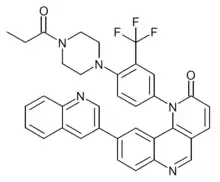Torin-1
Torin-1 is a drug which was one of the first non-rapalog derived inhibitors of the mechanistic target of rapamycin (mTOR) subtypes mTORC1 and mTORC2.[1][2][3] In animal studies it has anti-inflammatory,[4][5] anti-cancer,[6][7] and anti-aging properties,[8][9][10][11] and shows activity against neuropathic pain.[12][13][14]
 | |
| Identifiers | |
|---|---|
IUPAC name
| |
| CAS Number | |
| PubChem CID | |
| ChemSpider | |
| ChEBI | |
| ChEMBL | |
| CompTox Dashboard (EPA) | |
| Chemical and physical data | |
| Formula | C35H28F3N5O2 |
| Molar mass | 607.637 g·mol−1 |
| 3D model (JSmol) | |
SMILES
| |
InChI
| |
References
- Liu Q, Chang JW, Wang J, Kang SA, Thoreen CC, Markhard A, et al. (October 2010). "Discovery of 1-(4-(4-propionylpiperazin-1-yl)-3-(trifluoromethyl)phenyl)-9-(quinolin-3-yl)benzo[h][1,6]naphthyridin-2(1H)-one as a highly potent, selective mammalian target of rapamycin (mTOR) inhibitor for the treatment of cancer". Journal of Medicinal Chemistry. 53 (19): 7146–55. doi:10.1021/jm101144f. PMC 3893826. PMID 20860370.
- Schenone S, Brullo C, Musumeci F, Radi M, Botta M (2011). "ATP-competitive inhibitors of mTOR: an update". Current Medicinal Chemistry. 18 (20): 2995–3014. doi:10.2174/092986711796391651. hdl:11381/2432251. PMID 21651476.
- Liu Q, Kang SA, Thoreen CC, Hur W, Wang J, Chang JW, et al. (2012). "Development of ATP-competitive mTOR inhibitors". MTOR. Methods in Molecular Biology. Vol. 821. pp. 447–60. doi:10.1007/978-1-61779-430-8_29. ISBN 978-1-61779-429-2. PMC 3964610. PMID 22125084.
- Weichhart T, Haidinger M, Katholnig K, Kopecky C, Poglitsch M, Lassnig C, et al. (April 2011). "Inhibition of mTOR blocks the anti-inflammatory effects of glucocorticoids in myeloid immune cells". Blood. 117 (16): 4273–83. doi:10.1182/blood-2010-09-310888. PMID 21368289.
- Patel AB, Theoharides TC (June 2017). "Methoxyluteolin Inhibits Neuropeptide-stimulated Proinflammatory Mediator Release via mTOR Activation from Human Mast Cells". The Journal of Pharmacology and Experimental Therapeutics. 361 (3): 462–471. doi:10.1124/jpet.117.240564. PMID 28404689. S2CID 11750159.
- Francipane MG, Lagasse E (November 2013). "Selective targeting of human colon cancer stem-like cells by the mTOR inhibitor Torin-1". Oncotarget. 4 (11): 1948–62. doi:10.18632/oncotarget.1310. PMC 3875761. PMID 24185040.
- Jhanwar-Uniyal M, Gillick JL, Neil J, Tobias M, Thwing ZE, Murali R (January 2015). "Distinct signaling mechanisms of mTORC1 and mTORC2 in glioblastoma multiforme: a tale of two complexes". Advances in Biological Regulation. 57: 64–74. doi:10.1016/j.jbior.2014.09.004. PMID 25442674.
- Leontieva OV, Demidenko ZN, Blagosklonny MV (September 2015). "Dual mTORC1/C2 inhibitors suppress cellular geroconversion (a senescence program)". Oncotarget. 6 (27): 23238–48. doi:10.18632/oncotarget.4836. PMC 4695114. PMID 26177051.
- Leontieva OV, Blagosklonny MV (December 2016). "Gerosuppression by pan-mTOR inhibitors". Aging. 8 (12): 3535–3551. doi:10.18632/aging.101155. PMC 5270685. PMID 28077803.
- Mason JS, Wileman T, Chapman T (2018). "Lifespan extension without fertility reduction following dietary addition of the autophagy activator Torin1 in Drosophila melanogaster". PLOS ONE. 13 (1): e0190105. Bibcode:2018PLoSO..1390105M. doi:10.1371/journal.pone.0190105. PMC 5766080. PMID 29329306.
- Kucheryavenko O, Nelson G, von Zglinicki T, Korolchuk VI, Carroll B (June 2019). "The mTORC1-autophagy pathway is a target for senescent cell elimination". Biogerontology. 20 (3): 331–335. doi:10.1007/s10522-019-09802-9. PMC 6535413. PMID 30798505.
- Obara I, Tochiki KK, Géranton SM, Carr FB, Lumb BM, Liu Q, Hunt SP (November 2011). "Systemic inhibition of the mammalian target of rapamycin (mTOR) pathway reduces neuropathic pain in mice". Pain. 152 (11): 2582–95. doi:10.1016/j.pain.2011.07.025. PMID 21917376. S2CID 207309453.
- Choi S, Kim K, Cha M, Kim M, Lee BH (January 2020). "mTOR signaling intervention by Torin1 and XL388 in the insular cortex alleviates neuropathic pain". Neuroscience Letters. 718: 134742. doi:10.1016/j.neulet.2020.134742. PMID 31917234. S2CID 209898631.
- Kim K, Choi S, Cha M, Lee BH (April 2020). "Effects of mTOR inhibitors on neuropathic pain revealed by optical imaging of the insular cortex in rats". Brain Research. 1733: 146720. doi:10.1016/j.brainres.2020.146720. PMID 32061737. S2CID 211105385.
This article is issued from Wikipedia. The text is licensed under Creative Commons - Attribution - Sharealike. Additional terms may apply for the media files.